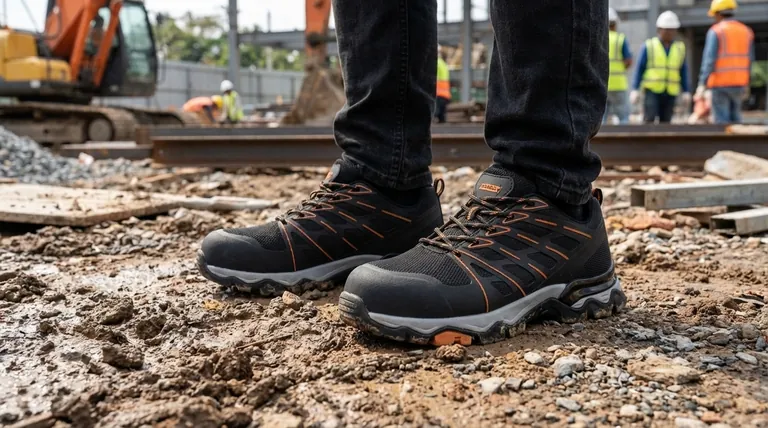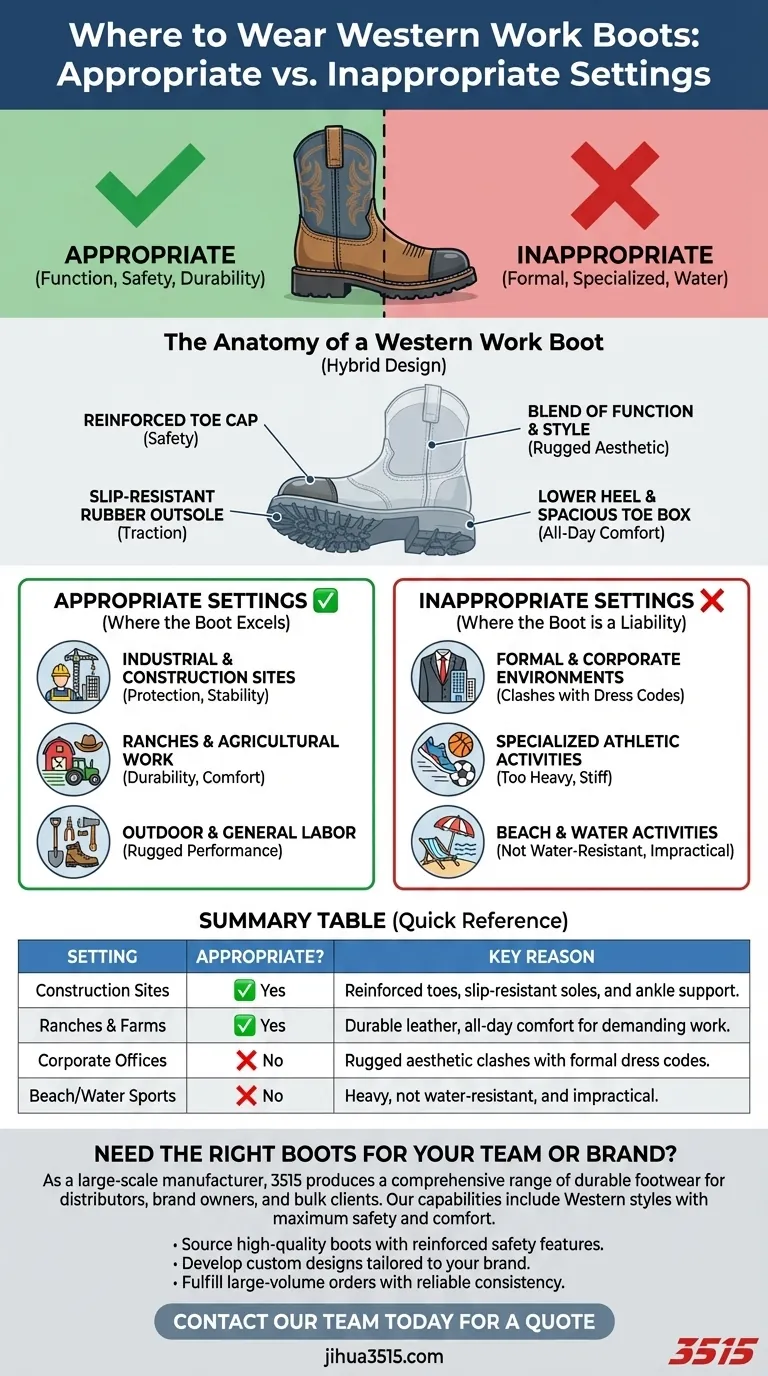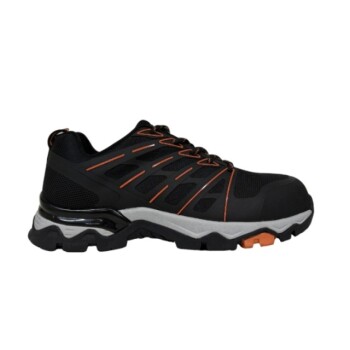Western work boots are designed for demanding environments where both durability and functionality are paramount. They are most appropriate on construction sites, ranches, in industrial workplaces, and for rugged outdoor activities. Conversely, their utilitarian design makes them inappropriate for formal events, most corporate offices with strict dress codes, specialized sports, or water-based activities.
The core principle is simple: a Western work boot's appropriateness is determined by its functional design. It excels where safety, all-day comfort, and durability are required, but its rugged aesthetic makes it a mismatch for formal or specialized settings.

The Anatomy of a Western Work Boot
A Western work boot is a purpose-built hybrid. It merges the protective features of a traditional work boot with the distinct profile and heritage of a classic cowboy boot.
Engineered for Safety and Durability
The primary function of these boots is protection. They typically feature reinforced toe caps (steel or composite), thick slip-resistant rubber outsoles, and sturdy leather construction to shield the wearer from job site hazards.
This focus on safety is what makes them a staple in physically demanding occupations.
Designed for All-Day Comfort
Unlike many fashion-oriented boots, Western work boots are built for long hours of standing and walking. They often have a lower heel than traditional cowboy boots, a more spacious toe box to prevent cramping, and cushioned insoles.
This construction reduces fatigue and prioritizes ergonomic support over pure style.
A Blend of Function and Style
While function is key, these boots retain a distinct Western aesthetic. They feature the characteristic decorative stitching and high-quality leather associated with cowboy boots, but often in a more subdued and rugged presentation.
They are a statement of practical capability, not just fashion.
Appropriate Settings: Where the Boot Excels
The boot's design makes it the right tool for specific jobs and environments where its features provide a clear advantage.
Industrial and Construction Sites
This is the boot's natural habitat. The combination of reinforced toes, ankle support, and high-traction soles provides the necessary protection and stability for unpredictable and hazardous terrain.
Ranches and Agricultural Work
For farm and ranch work, the boot's durability and comfort are essential. The sturdy leather withstands exposure to the elements, and the supportive design is ideal for long days spent on your feet.
Outdoor and General Labor
For activities like landscaping, heavy-duty maintenance, or even recreational pursuits like camping, the boot's ruggedness and protective qualities offer superior performance compared to standard footwear.
Understanding the Trade-offs: Inappropriate Settings
The very features that make the Western work boot excel in demanding environments become liabilities in others. Its utilitarian nature creates clear boundaries.
Formal and Corporate Environments
The boot's rugged appearance, thick sole, and often-visible stitching are fundamentally at odds with formal or business professional dress codes. It projects a casual, work-oriented image that clashes with the expectations of these settings.
Specialized Athletic Activities
These boots are heavy and relatively stiff. They are not designed for the specific movements required in sports like running, basketball, or soccer, where specialized, lightweight footwear is critical for performance and injury prevention.
Beach and Water Activities
Leather and water are a poor combination. Western work boots are heavy, not water-resistant by default, and would be extremely impractical and uncomfortable in sandy or wet conditions.
Making the Right Choice for Your Goal
Ultimately, choosing when to wear these boots comes down to matching the tool to the task.
- If your primary focus is safety on a job site: These boots are an excellent choice, providing certified protection and all-day comfort.
- If your primary focus is casual style and durability: They are a versatile option for informal settings, pairing well with jeans for a rugged, everyday look.
- If your primary focus is a formal or business event: You should always opt for traditional dress shoes to meet professional and social expectations.
Understanding the purpose built into every stitch of a Western work boot is the key to wearing it correctly and with confidence.
Summary Table:
| Setting | Appropriate? | Key Reason |
|---|---|---|
| Construction Sites | ✅ Yes | Reinforced toes, slip-resistant soles, and ankle support. |
| Ranches & Farms | ✅ Yes | Durable leather, all-day comfort for demanding work. |
| Corporate Offices | ❌ No | Rugged aesthetic clashes with formal dress codes. |
| Beach/Water Sports | ❌ No | Heavy, not water-resistant, and impractical. |
Need the Right Boots for Your Team or Brand?
As a large-scale manufacturer, 3515 produces a comprehensive range of durable footwear for distributors, brand owners, and bulk clients. Our production capabilities encompass all types of work boots, including Western styles designed for maximum safety and comfort in demanding environments.
We can help you:
- Source high-quality boots with reinforced safety features.
- Develop custom designs tailored to your brand and market.
- Fulfill large-volume orders with reliable manufacturing consistency.
Contact our team today to discuss your footwear needs and get a quote.
Visual Guide

Related Products
- Premium KPU Injection Athletic Style Safety Shoes
- Premium High-Cut Waterproof Safety Boots Manufacturing & Wholesale Solutions
- High Performance Fire-Retardant Waterproof Safety Boots
- Premium Wholesale Waterproof Safety Boots High Performance Protection for Industrial Markets
- Heavy-Duty Waterproof Nubuck Safety Boots Safety Shoes for Bulk Supply
People Also Ask
- Why is expert help recommended when selecting safety shoes? Ensure Perfect Fit & Hazard Protection
- Why is safety the top priority when selecting oilfield work boots? Essential Protection for High-Risk Environments
- What safety standards should oilfield work boots meet? Ensure OSHA & ASTM F2413 Compliance
- What is the purpose of puncture-resistant footwear? Protect Your Feet from Sharp Hazards
- What is the ASTM standard for puncture resistance? A Guide to Selecting the Right Protective Footwear



















